June 15, 2025 | 08:10 GMT +7
June 15, 2025 | 08:10 GMT +7
Hotline: 0913.378.918
June 15, 2025 | 08:10 GMT +7
Hotline: 0913.378.918
During the conference, Deputy Minister Phung Duc Tien reported that Typhoon No. 3 had caused extensive damage to the national economy, with an estimated loss of approximately 81.5 trillion VND. Accordingly, agriculture was the most affected sector, with fishery and livestock production suffering the most considerable losses.
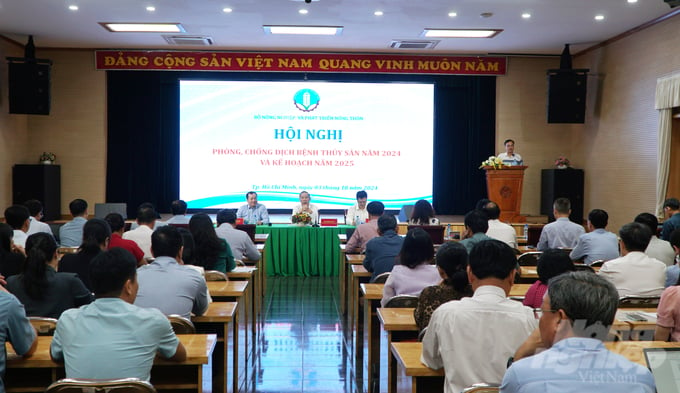
The conference aimed to boost aquaculture production, with the aim of maintaining growth momentum following the typhoon. Photo: Le Binh.
According to preliminary statistics, the fishery sector incurred losses exceeding 6 trillion VND, whereas livestock production suffered approximately 1 trillion VND in damages. Despite achieving and surpassing targets for productivity and quality in the first nine months of 2024, these statistics will have a significant impact on the results in October. Consequently, the Ministry of Agriculture and Rural Development and local governments must enhance production in provinces unaffected by Typhoon No. 3 with the aim of meeting the previously established plan.
“Aquaculture primarily supports local demands in the northern mountainous provinces, whereas provinces in the south focus on exports. The southern region houses a total aquaculture area of 1.3 million hectares, with approximately 704,000 hectares of shrimp production area producing a yield of 1.04 million tons in 2023. The region also houses 6,000 hectares of shark catfish production area. Aquaculture exports from the region generated approximately 7.2 billion USD in revenue during the first nine months of 2024. Notably, the region aims to reach 10.5 billion USD by the end of the year,” reported Deputy Minister Phung Duc Tien.
Tran Dinh Luan, General Director of the Directorate of Fisheries, noted that after receiving instructions from the Ministry of Agriculture and Rural Development, the Directorate has conducted assessments on the damages to aquaculture species affected by recent natural disasters. As a result, stakeholders will develop a detailed recovery plan to compensate for the losses in other fields.
“Our key task until the end of the year is to further enhance aquaculture production to recover from the typhoon and maintain an annual growth rate of at least 3.5 to 4% in the fishery sector, which represents approximately 28% of the agricultural sector,” Deputy Minister Phung Duc Tien explained.
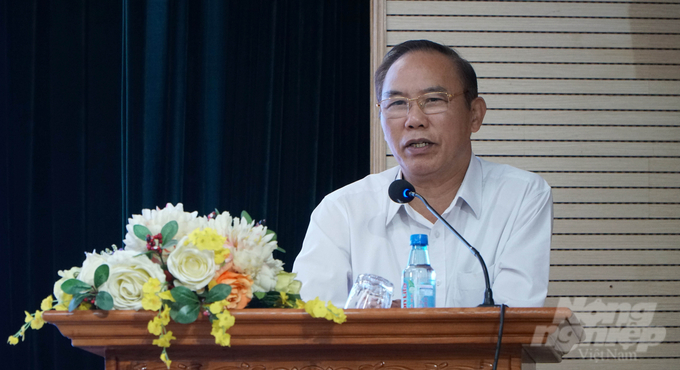
Deputy Minister Phung Duc Tien delivering a directive speech at the conference. Photo: Le Binh.
Vietnam has extensive areas suitable for the development of mariculture, reservoirs, and a network of rivers and canals that support diverse aquaculture species such as shrimp, fish, seaweed, oysters, and mollusks. Consequently, local governments must adopt flexible measures to utilize their potential amid the current challenges.
In response to the damages suffered by aquaculture farmers in the northern region, General Director Tran Dinh Luan suggested stimulating production by transitioning to seaweed cultivation. This aquaculture species requires minimal effort and capital for reinvestment. Seaweed is suitable for the current requirement of “short-term cultivation for long-term gains.” On the other hand, it represents a new development direction with numerous processing opportunities in the food industry and as raw materials for pharmaceuticals and cosmetics.
Farmers in the northern aquaculture areas that experienced losses recently received 1 million seaweed seedlings for replanting. Deputy Minister Phung Duc Tien also requested local governments to research the market potential for post-harvest seaweed products.
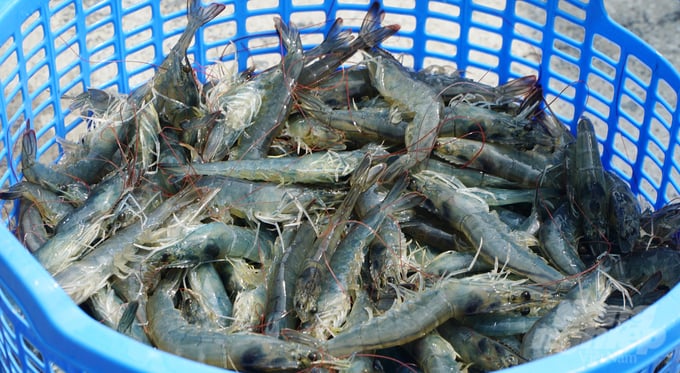
Provinces in Southern Vietnam must enhance the quantity and quality of seafood to maintain growth momentum following the typhoon. Photo: Le Binh.
With less than three months remaining in 2024, white leg shrimp farmers in the northern region must reallocate all resources to sustain production. The production of other species and mariculture are projected to recover with more tangible results and manageable challenges.
“It is essential to promote the production of white leg shrimp, giant river prawns, lobsters, basa catfish, mollusks, and marine species to compensate for the production losses in the northern area. The prices of seafood are gradually increasing, which means new opportunities for farmess. With strong support from the Ministry of Agriculture and Rural Development and local agencies, achieving this goal is entirely feasible,” commented Deputy Minister Phung Duc Tien.
During the first nine months of 2024, Vietnam has effectively managed various aquaculture diseases, with a reduction of approximately 30% compared to the corresponding period in 2023. However, disease outbreaks pose a significant challenge to the production of shrimp, catfish, and freshwater aquaculture species.
Accordingly, the aquaculture production area affected by diseases has decreased to 4,257 hectares (a reduction of 28.94% compared to the corresponding period in 2023). Additionally, the area of aquaculture suffering losses due to the negative impacts of climate change, environmental pollution, and undetermined causes stands at 17,316 hectares, along with 3,936 ponds, cages, and nets, accounting for over 80% of the total losses in aquaculture.
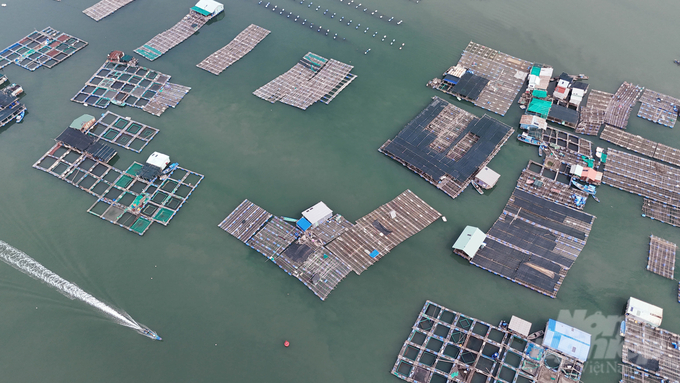
For cage and natural environment aquaculture, attention must be given to regular monitoring and ensuring water quality. Photo: Le Binh.
Nguyen Van Long, General Director of the Department of Animal Health, commented that the Department is collaborating with the Directorate of Fisheries to enhance early and remote disease prevention and monitoring through the application of technical measures and scientific technologies. Environmental issues are crucial to the development of aquaculture activities, with water treatment to prevent pollution being a notable example.
“With the goal in mind, farmers must source seed stock from disease-free facilities; otherwise, outbreaks are highly likely. Even the feed for shrimp and aquaculture species can introduce pathogens. Quarantine during transportation is also essential to protect these seed sources from diseases,” General Director Long emphasized.
Furthermore, the current use of vaccines for disease prevention in aquaculture is relatively limited, with vaccines only available for shark catfish and a select number of freshwater species. On the other hand, diseases affecting shrimp, especially white spot syndrome, acute hepatopancreatic necrosis disease, and the recent emergence of EHP, a parasite affecting shrimp, present significant challenges for aquaculture.
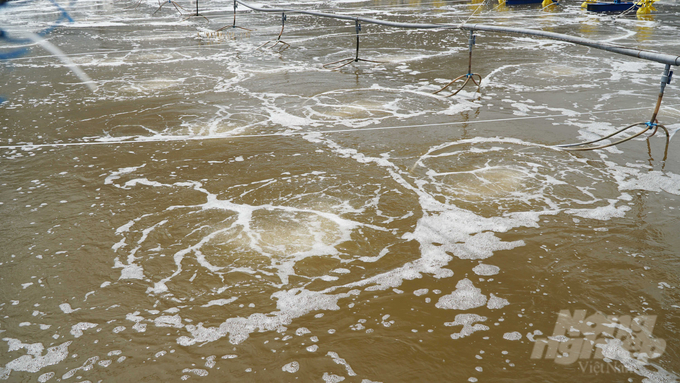
Maintaining water quality is a key challenge in disease prevention and control in the fishery sector. Photo: Le Binh.
Vietnam's agricultural sector is facing a backdrop of rapid urbanization and industrialization, which can cause an increase in both household and hazardous waste. Consequently, rivers and their basins are experiencing severe pollution, with aquaculture being the most heavily affected aspect. This reality presents a challenge that the fishery sector must address to achieve sustainable development.
"It is common knowledge that we must first manage water before focusing on shrimp farming. As a result, we must prioritize management efforts. Additionally, the fishery sector must utilize an array of monitoring and warning systems. The veterinary sector needs to focus on disease prevention and biosecurity, thereby addressing existing issues and challenges to accelerate aquaculture production," emphasized Deputy Minister Phung Duc Tien.
Translated by Nguyen Hai Long

(VAN) The working delegation from the Ministry of Agriculture and Environment conducted an important trip to the Netherlands to strengthen strategic partnerships and sustainable development in the agricultural sector.

(VAN) The letter ‘A Plea from the Ocean’ not only evokes emotion but also awakens the human conscience to the responsibility of protecting life on Earth.

(VAN) The Department of Agriculture in South Africa has announced the country’s first mass vaccination of poultry to prevent local birds from contracting avian influenza.

(VAN) Establishment of the Mekong Delta Regional Agricultural Linkage Center, aiming for a closed value chain, deep processing, trading platforms, and international market connectivity.

(VAN) Gia Lai province has recently recorded 460 rare species of animals and plants, contributing to forest conservation and biodiversity planning in the region.

(VAN) Ms. Caroline Beresford, New Zealand Ambassador to Vietnam, expressed confidence that agricultural cooperation between Vietnam and New Zealand will develop sustainably, be climate-resilient, and promote gender equality.

(VAN) Vietnam reaffirms its commitment to international cooperation in fostering sustainable and responsible fisheries while ensuring resilient livelihoods for small-scale fishing communities.